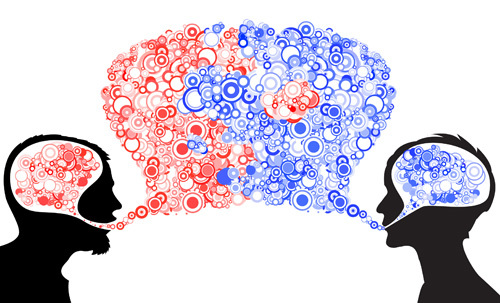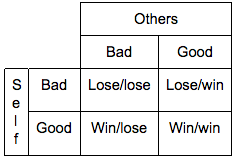|
When push comes to shove, how do we choose who wins and who loses in our decision making process between self and others? Our lives are a tension between negotiation and competition. Most of us have allegiance to both. We say, "Let the best plan for all of us win" (Negotiation), and "it better be mine." (Competition). These three paragraphs had me reflecting on this process and one of the solutions I’ve come up with this year, even if I haven’t actually implemented it with anyone. It involves a simple two by two matrix with both good and bad consequences potentially happening for the self or others when making a decision. From the above, there are obvious decisions that shouldn’t be made. Those are decisions where both self and others are worse off as a result, the “lose/lose” box. Then there are decisions where it is obvious that we should decide in favor of something, the ones in which both self and others win, the bottom right box above.
However, there are still two boxes where self and other are at odds and this is exactly what the opening three paragraphs was discussing as to a time when we need to enter negotiation. I have not used that term myself (negotiation that is), but have come pretty close and so it made intuitive sense to me. Instead, I’ve focused on the word dialogue and also using a rudimentary and hypothetical utilitarian system in order to reach a decision. A Solution That hypothetical system would work something like this. Let’s say a decision can have an impact on my “well-being continuum”, which runs from negative 10 to positive 10, with negative 10 being the worse suffering and positive 10 being a state of bliss, nirvana, etc. For the math inclined, that is -10 ≤ x ≤ 10. One theoretical way to work out decisions when only two people are involved within the “win/lose” boxes is to have both parties give a subjective rating of how a decision would impact their well-being continuum. If party A believes the decision will give them positive 6 points on the continuum, while party B believes it will give them negative 2 points on their continuum, then I say the two people should agree to favor party A. Obviously, this would work in the opposite direction as well. This system has a few obvious flaws. One, people are proven to be very poor at estimating how much happiness or suffering any given decision will bring them.2 Two, it requires genuine dialogue, reflection, and honesty on both parties’ account, a difficult task for even the closest of people. And third, it becomes more and more unwieldy the more parties participate in it. At some point, it is probably better to just turn to regular ol’ run of the mill democracy and take a vote. The benefit a system like this would provide is the basis for caring, open, and rational deliberation on decisions where not everyone will win and the recognition that both parties are not winning. That recognition, that not everyone benefits from all decisions, is itself a valuable insight for many situations that can lead to a deeper sense of caring and reciprocity on everyone’s part. It even has the potential to promote appeasing others as the benefit becomes more and more clear through practice and awareness. It is much easier to accept a “loss” or even prefer it when you receive the pleasure of knowing just how much the other is benefitting and how little you are giving up in return. “The best prevention is awareness, a keen understanding of the human condition and how it plays out in us all. It is through facing the darkness in ourselves that we can shed greater light within and around us.”1 References
0 Comments
Leave a Reply. |
Archives
November 2017
|


 RSS Feed
RSS Feed